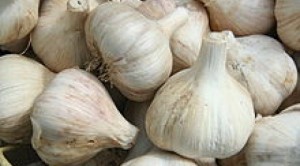Palace explains high cost of food; clueless on garlic price spike
MANILA, Philippines – Demand for sugar rose, piglets acquired diseases while hot weather stunted the growth of chickens. These are among the reasons cited by Malacañang on why prices of basic commodities have been rising.
However, it has yet to ferret out the real reason behind the increase in garlic prices.
“Doon naman sa garlic, sinusuri po ng Department of Agriculture ‘yung sitwasyon diyan dahil karamihan po talaga sa ating ginagamit na garlic o bawang ay imported,” Communications Secretary Herminio Coloma Jr. said over state-run radio.
(As to the rising price of garlic, the Department of Agriculture is still studying the situation because most of our garlic supply is imported.)
The statement came a week after government promised to get to the bottom of things as prices of agricultural products suddenly spiked.
Article continues after this advertisementMalacañang earlier announced that the supply of garlic in the country is enough and that it should not cause price fluctuations. It said government would continue to investigate the matter, especially the possibility of hoarding.
Article continues after this advertisementLast week, the National Price Coordinating Council met to discuss the pressing issue that has prompted complaints from consumers.
The meeting revealed that demand for sugar increased, resulting in the commodity’s price hike.
“Tumaas po ang presyo na umabot sa 52 pesos (bawat kilo). Ngunit sa kanila din pong pagtutok o monitoring ay bumaba din ito sa 49 pesos at meron pong suggested retail price ang sugar at ito po ay nasa 50 pesos kada kilo,” Coloma said.
(The price of sugar rose to P52 per kilo. But based on the monitoring of government agencies, it went down to P49 while the suggested retail price is at P50 per kilo.)
Meanwhile, the increased price of pork was attributed to the Porcine Epidemic Diarrhea (PED). The spread of the disease resulted in tighter supply, Coloma said.
He pointed out that the same epidemic hit United States in the past, affecting eight million piglets.
Local hog raisers are expecting prices to go down again as the situation normalizes, he said.
“Ayon naman sa asosasyon ng mga poultry growers or poultry raisers, ‘yung mainit na temperatura nitong tag-init ay naging contributory factor naman sa mabagal na paglaki ‘nung mga manok. Ibig sabihin mababa ang kanilang timbang kaya ito po ang isa sa mga sanhi ng temporary shortage,” the Secretary added.
(According to the association of poultry raisers, the hot weather contributed to the slow growth of chickens. The decreased weight is one of the causes of the temporary shortage.)
Coloma assured the public that the government is also monitoring the price of other food stables like vegetables.
He admitted that the truck ban in Manila might have partly affected the prices of commodities.
“Tinututukan po ‘yan pero hindi po ‘yan ang pangunahing dahilan, contributory factor lang po, at patuloy naman ‘yung pagsisikap na ma-clear po ‘yung backlog ng mga kargamento na naipit sa ating Port of Manila dahil diyan at sino-solve naman po, ina-address po ‘yung problema,” Coloma said of the truck ban.
(We are looking at that but that’s not the primary reason, it’s just a contributory factor. We continue to strive to clear the backlog of cargos held at the Port of Manila.)
Coloma said the government is doing everything to ensure that prices are not being artificially propped up.
Meantime, he said the Department of Agriculture already has rolling stores in Muntinlupa, Pasig, Marikina and Quezon City selling local garlic at P100 to P200 per kilo.
RELATED STORIES
100 MT of garlic smuggled from HK seized
Low supply? hoarding? DA probes ‘garlic gold’
DA selling garlic from rolling stores as it probes price hike
